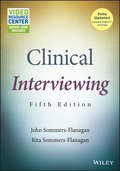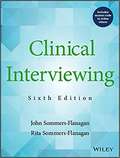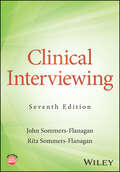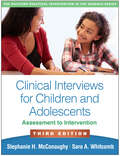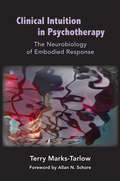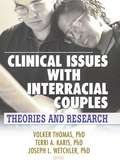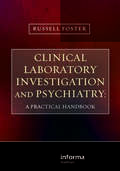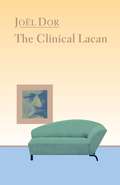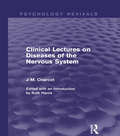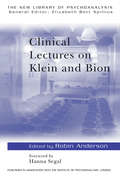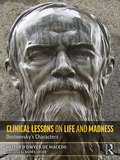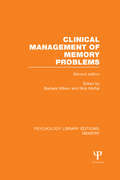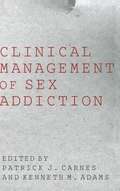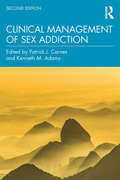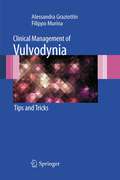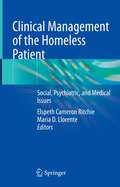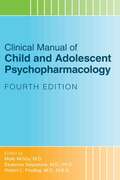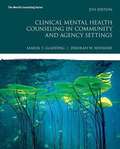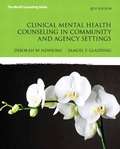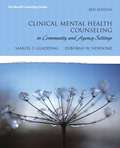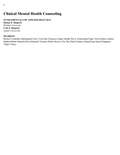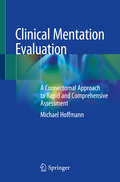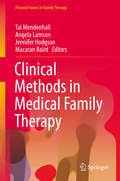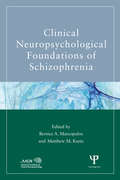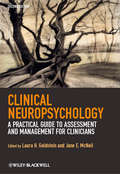- Table View
- List View
Clinical Interviewing
by John Sommers-Flanagan Rita Sommers-FlanaganThe Fourth Edition of the classic Clinical Interviewing by John and Rita Sommers-Flanagan reflects current research in the field as well as an important expansion of multicultural content throughout. Fully revised, this invaluable text will help you sharpen your counseling skills with thoughtful insight into critical interviewing techniques that will result in more effective and compassionate therapy. Complete with real-world case examples, this essential guide equips you to master the skills necessary in mental health interviewing.
Clinical Interviewing
by John Sommers-Flanagan Rita Sommers-FlanaganClinical Interviewing is the essential guide to conducting initial interviews, suicide assessment, mental status examinations, and psychotherapy skill development. The Sixth Edition includes: Updates focusing on latest trends in clinical interviewing research and practice Updated information on technology-based interviewing Access to over 70 videos that show the authors discussing and demonstrating crucial interviewing techniques Online instructor’s manual and resources to facilitate teaching Fresh case examples to help apply interviewing skills and concepts New coverage of special populations and multicultural considerations Expanded skills coverage to help facilitate client insight and action This new edition also includes a Registration Access Card with a unique one-time code to access the Wiley Interactive E-Text (Powered by VitalSource), enhanced with dynamic content, including instructional videos and practice questions to further enrich student learning. It provides uninterrupted, mobile access anywhere, anytime. <P><P><i>Advisory: Bookshare has learned that this book offers only partial accessibility. We have kept it in the collection because it is useful for some of our members. Benetech is actively working on projects to improve accessibility issues such as these.</i>
Clinical Interviewing
by John Sommers-Flanagan Rita Sommers-FlanaganLearn to conduct state-of-the-art clinical interviews in therapeutic settings Clinical interviewing is the foundation upon which all counselling and psychotherapy rests. In the newly revised seventh edition of Clinical Interviewing, John and Rita Sommers-Flanagan provide a comprehensive analysis and discussion of the clinical interview, along with skill-building applications. Extensive and practical coverage of culturally sensitive assessment, case formulation, treatment planning, and psychosocial interventions are included. This new edition continues in the Sommers-Flanagan's tradition of relationally oriented clinical interviewing; it also offers fresh content, cutting-edge citations, diverse case examples, updated language, and more deeply integrates culture, ethnicities, and diverse representation, while strengthening the book's evidence-based orientation. Learners will have an engaging reading experience with trusted authors who cover vital content for all mental health professionals. Readers will also find: Complementary videos that feature a diverse range of clinicians and clients discussing core ideas and demonstrating key techniques Guidance and strategies for clinician stress management and self-care For the instructor's edition: An online instructor's manual with supplementary lecture ideas, discussion questions, classroom demonstrations, an online test bank, and downloadable PowerPoint slides An essential text covering an equally essential topic, Clinical Interviewing is written for aspiring and practicing counselors, psychotherapists, and mental health professionals seeking up-to-date guidance on how to conduct a state-of-the-art (and science) clinical interview.
Clinical Interviews for Children and Adolescents, Third Edition: Assessment to Intervention (The Guilford Practical Intervention in the Schools Series)
by Sara A. Whitcomb Stephanie H. McConaughyWidely recognized as an authoritative resource, this book has been revised and updated with the latest research and techniques, including new material on telehealth services. Guidelines are provided for conducting thorough, developmentally informed interviews with K–12 students--and their parents and teachers--for multimethod assessment and intervention planning. Extensive case examples illustrate how to elicit information about school functioning, peer relations, emotional and behavioral difficulties, family situations, and adolescent concerns. Two guest authors have contributed chapters on suicide and violence risk assessments. In a convenient large-size format, the book includes over a dozen reproducible interviewing tools; purchasers get access to a Web page where they can download and print the reproducible materials. New to This Edition *Incorporates the latest information on bullying, cyberbullying, and victimization; sexual- and gender-minority youth; social media and smartphone use; and adolescent substance use. *Discusses strategies, tips, and caveats for conducting virtual interviews. *Expanded coverage of cultural and linguistic biases in assessment and how practitioners can build multicultural competence. *Revised and expanded reproducible tool: Semistructured Student Interview--Second Edition. This book is in The Guilford Practical Intervention in the Schools Series, edited by Sandra M. Chafouleas.
Clinical Intuition in Psychotherapy: The Neurobiology of Embodied Response (Norton Series on Interpersonal Neurobiology)
by Terry Marks-TarlowA systematic look at the role of "gut feelings" in psychotherapy. What actually happens in psychotherapy, outside the confines of therapeutic models and techniques? How can clinicians learn to pick up on interpersonal nuance, using their intuition to bridge the gap between theory and practice? Drawing from 30 years of clinical experience, Marks-Tarlow explores the central-- yet neglected--topic of intuition in psychotherapy, sharing clinical insights and intuitions that can help transform traumatized brains into healthy minds. Bridging art and science, Clinical Intuition in Psychotherapy is grounded in interpersonal neurobiology, and filled with rich case vignettes, personal stories, and original artwork. In the early chapters of the book, Marks-Tarlow defines clinical intuition as a right-brain, fully embodied mode of perceiving, relating, and responding to the ongoing flows and changing dynamics of psychotherapy. She examines how the body "has a mind of its own" in the form of implicit processes, uncovering the implicit roots of clinical intuition within human empathy and emphasizing the importance of play to clinical intuition. Encouraging therapists to bring their own unique senses of humor to clinical practice, she explains how the creative neural powers of playfulness, embedded within sensitive clinical dialogs, can move clients' lives toward lasting positive affective growth. Later chapters explore the play of imagination within clinical intuition, where imagery and metaphor can lead to deeper insight about underlying emotions and relational truths than words alone; the developmental foundations for intuition; and clinical intuition as a vehicle for developing and expressing wisdom. At the close of each chapter, reflective exercises help the reader personally integrate the concepts. Part of the Norton Series on Interpersonal Neurobiology, this wonderful guidebook will help clinicians harness the power of spontaneous intuitive thinking to transform their therapeutic practices.
Clinical Issues with Interracial Couples: Theories and Research
by Joseph L. Wetchler Volker Thomas Terri KarisGo beyond cookie-cutter therapy and interventions to provide culturally relevant therapy that works for your clients in interracial relationships! With this book, you'll explore an array of relational issues faced by various configurations of interracial couples. Then you'll learn specific intervention strategies for treating these couples in therapy. The first section presents research and theoretical chapters on issues faced by interracial couples who are heterosexual; the second focuses on issues facing racially mixed gay and lesbian couples; and the third provides you with specific interventions to use with couples in interracial relationships. Clinical Issues with Interracial Couples: Theories and Research is an important addition to the collection of any therapist who counts an interracial couple among his or her clients. From the editors: "Although interracial couples face challenges related to differences in their racial backgrounds, couple and family theories have had little to say about how to work with these differences. Not all couples are white, married, and heterosexual, and there is a growing understanding that clinical practices based on these assumptions may not be adequate when working with interracial couples. Recognizing the diversity of our clients, the intent of this book is to contribute to more respectful and inclusive clinical practices that can address the treatment issues we face in the first decade of the twenty-first century." The first section of this book examines challenges faced by heterosexual interracial couples, focusing on: how black/white couples experience and respond to racism and how they negotiate the racial and ethnic differences they face in their relationships the significance of race-or lack of it-in white women's relationships with black men, with suggestions on how to create a therapeutic space for discussing race without over-determining its significance marriages where one partner is of Latino/a descent and the other of non-Latino/a white descent-a pilot study of a rarely investigated population! approaches, interventions, and strategies to use when treating multicultural Muslim couples Hawaii's unusual history of interracial ties and relationships, the common challenges that face interracial couples there, and therapeutic interventions that can benefit them The second section of Clinical Issues with Interracial Couples looks at the issues faced by same-sex interracial couples. Here is a sample of what you'll find: clinical considerations for working with interracial/intercultural lesbian couples pitfalls to avoid in therapy as well as suggestions for a conceptual approach for gay Latino men in cross-cultural relationships The book's final section presents interventions for use with interracial couples. Here you'll find: assessment techniques and interventions geared toward black-white couples information on doing effective therapy with Latino/a-white couples a case study of the therapeutic process as applied to an Asian-American woman married to a white man seven therapists' perspectives on working with interracial couples-focusing on the historical context of intermarriage, specific concerns and issues that interracial couples experience in their relationships, and the experiences of therapists working with this diverse and challenging client population
Clinical Laboratory Investigation and Psychiatry: A Practical Handbook
by Russell FosterA precise, practical handbook, Clinical Laboratory Investigation and Psychiatry is an invaluable tool that explores day-to-day psychiatric practices and various situations that arise in the field of mental health. This unique and resourceful textbook is a must-have aid for front-line clinicians, psychiatrists, and other professionals working in the
Clinical Lacan: The Unconscious Structured Like A Language (Lacanian Clinical Field)
by Joel DorAbout this Book...This companion text to Introduction the Reading of Lacan focuses on the concept of the psychic structures of desire. Using case examples, Dor explains the crucial difference between symptomsówhich can be phenomenologically graspedóand the actual psychic structure of the subjectówhich can be revealed only through the discourse of the patient in the psychoanalytic situation. This work brings life and practicality to a psychoanalytic movement that has been misperceived and divorced from the daily vicissitudes of analytic work.
Clinical Lectures on Diseases of the Nervous System: Delivered At The Infirmary Of La Salpetriere; Containing Eighty-six Woodcuts (classic Reprint) (Psychology Revivals)
by J-M. CharcotOriginally published in 1991 as part of the Tavistock Classics in the History of Psychiatry series, this re-edition of J-M. Charcot’s Clinical Lectures on Diseases of the Nervous System provides a unique opportunity to examine the work of one of the last century’s most controversial and admired physicians. Widely esteemed for his work in neuropathology, Charcot was also an innovator in the study of hysteria, making important contributions to its study in both women and men. The Clinical Lectures reproduced here are especially important for two key reasons. First, they provide insight into Charcot’s often neglected study of male hysteria, especially traumatic shock, as well as, hysteria among children. Secondly, they give an opportunity to examine his clinical method and style. His presentations and scholarly compilations greatly influenced an entire generation of French and other physicians interested in the study of the ‘unconscious’ during the turn of the century. The introduction, which precedes the work, places the volume in its social, political and historical context. It highlights the key features of the historiographical debate surrounding Charcot, which ranges in scope from the social and intellectual history of the Third Republic through that of early psychoanalysis. It then proceeds with an examination of the key themes – both substantive and methodological – underlying Charcot’s researches, providing both a general entrée into the history of medicine and society in this period, as well as an explication du texte which carefully analyses the lectures themselves.
Clinical Lectures on Klein and Bion (The New Library of Psychoanalysis #No. 14)
by Elizabeth Bott Spillius Robin AndersonClinical Lectures on Klein and Bion outlines the basic ideas in their thinking and shows in detail how these ideas can be used to tackle a clinical problem. The contributors correct some common misconceptions about Kleinian analysis, while demonstrating the continuity of their everyday work with seminal ideas of Klein and Bion. Originally given as a series of lectures intended to acquaint the general public with recent developments in psychoanalytic thinking and practice, the papers in this book cover the most fundamental ideas put forward by Klein and Bion; child analysis, Klein's use of the concepts of unconscious phantasy, projective identification, the paranoid-schizoid and depressive positions, Bion's study of psychotic thinking, his ideas of the relation between container and contained, and the usefulness of the ideas of reversible perspective in understanding 'as if' personalities. In particular, this book provides an eminently readable and authoritative introduction to some of the most original and controversial concepts ever put forward in psychoanalysis.
Clinical Lessons on Life and Madness: Dostoevsky's Characters
by Heitor O’Dwyer de MacedoThe author of Clinical Lessons on Life and Madness: Dostoevsky’s Characters draws on Dostoevsky's universe to illuminate psychoanalytic theory and practice. Using Dostoevsky’s characters as case studies, the author discusses the various psychoanalytic concepts they embody, and shows how these insights can be applied to therapeutic understanding. By considering the people who populate Dostoevsky’s world as personifying a whole spectrum of human possibilities and modes of relation, Heitor O'Dwyer de Macedo’s discussion of the characters – including those from Notes from Underground, Crime and Punishment and The Brothers Karamazov – allows him to explore fundamental issues constitutive of clinical practice, such as trauma, fantasy, perversion and madness. Clinical Lessons on Life and Madness will provide an important resource for psychoanalysts with an interest in literature, as well as students of literature seeking a psychoanalytic interpretation.
Clinical Management of Memory Problems (Psychology Library Editions: Memory)
by Barbara Wilson Nick MoffatMany patients with stroke, head injuries or dementia suffer severe memory impairment and in many cases improvement may fail to occur. This book, first published in 1984 followed by this second edition in 1992, offers practical guidelines to the problems and is supported by a discussion of theory about memory systems and functioning. It should enable therapists and psychologists to recognize, understand, assess and manage memory problems arising from injury, accident or infection of the brain. The authors are well-known for their interest in memory and memory therapy. Topics covered in this text include: the relationship between memory and practice, assessment, methods for improving memory, organization of memory therapy, selection of appropriate treatments for individual patients, role of the microcomputer in memory rehabilitation, use of drugs in stimulating memory, development of programmes to improve attention and the treatment of the memory-impaired in groups. This second edition has an update on drugs, electronic aids and assessment procedures, with further evidence of the effectiveness of memory therapy. This book would have been an asset for those professionals involved in the rehabilitation of the impaired memory at the time and can still be of value today.
Clinical Management of Sex Addiction
by Kenneth M. Adams Patrick J. CarnesThis is the first comprehensive volume of the clinical management of sex addiction. Collecting the work of 28 leaders in this emerging field, the editors provide a long-needed primary text about how to approach treatment with these challenging patients. The book serves as an excellent introduction for professionals new to the field as well as serving as a useful reference tool. The contributors are literally the pioneers of one of the last frontiers of addiction medicine and sex therapy. With a growing awareness of sex addiction as a problem, plus the advent of cybersex compulsion, professional clinicians are being confronted with sexual compulsion with little clinical or academic preparation. This is the first book distilling the experience of the leaders in this emerging field. With a focus on special populations, it also becomes a handy problem-solving tool. Readable, concise, and filled with useful interventions, it is a key text for a problem clinicians must be able to identify. It is destined to be a classic reference.
Clinical Management of Sex Addiction
by Kenneth M. Adams Patrick J. CarnesClinical Management of Sex Addiction’s newest edition updates many of the original chapters from 28 leaders in the field with new findings and treatment methods in the field of sex addiction. With a growing awareness of sex addiction as a problem, plus the advent of cybersex compulsion, professional clinicians are being confronted with sexual compulsion with little clinical or academic preparation. This is the first book distilling the experience of the leaders in this emerging field. It additionally provides new chapters on emerging areas of interest, including partner counseling, trauma and sexual addiction, and adolescent sex addiction. With a focus on special populations, the book creates a current and coherent reference for the therapist who faces quickly escalating new constellations of addictive sexual behavior. Readable, concise, and filled with useful interventions, it is a key text for professionals new to field and a classic reference for all clinicians who treat sex addiction
Clinical Management of Vulvodynia: Tips and Tricks
by Filippo Murina Alessandra GraziottinChronic vulvar pain, or 'vulvodynia', is a common problem that can have a considerable impact on the wellbeing of patients. Despite being seen routinely in everyday clinical practice, it remains a neglected disorder that may take many years to diagnose. This book eases the way for physicians, including General Practitioners and Gynecologists, who are motivated to improve the lives of women suffering from vulvodynia. By offering a concise overview of the latest information on the diagnosis and management of vulvodynia, and its numerous comorbidities, in an easy to read, 'tips and tricks' format, the book empowers physicians to rapidly and effectively address the complex and sensitive issues surrounding the disorder.
Clinical Management of the Homeless Patient: Social, Psychiatric, and Medical Issues
by Elspeth Cameron Ritchie Maria D. LlorenteThis volume highlights the socioeconomic concerns related to medical care for homeless patients and places them at the interface of common psychiatric and medical problems clinicians encounter. Written by experts in psychiatry and other medical specialties, this volume is a concise, yet comprehensive overview of the homeless crisis, its costs, and ultimately, best practices for improved outcomes. The text begins by examining the scope and epidemiology of the problem and discusses its costs. It then examines the best practices for both physical and psychiatric care before concluding with a section on working with special populations that have unique concerns across the country including LGBTQ, women, children, veterans, and aging adults. As the first medical book on homelessness, it is designed to cover a broad range of concerns in a concise, practical fashion for all clinicians working with homeless patients. Clinical Management of the Homeless Patient is written by and for psychiatrists, general internists, geriatricians, pediatricians, addiction medicine physicians, VA physicians, and all others who may encounter this crisis in their work.
Clinical Manual Of Child And Adolescent Psychopharmacology
by Robert L. Findling Ekaterina Stepanova Molly McVoyWhen it comes to the use of psychotropic agents in pediatric patients, it is not merely a question of extrapolating data from adults to children and adolescents; special consideration must be given to the effects of the drug on developing bodies and brains. That is what makes this fourth edition of the Clinical Manual of Child and Adolescent Psychopharmacology so essential. Updated to include a succinct yet thorough review of the most recent evidence-based information and data-driven best treatment practices in child and adolescent psychiatry, this new volume is organized by DSM-5-TR diagnosis and offers an exhaustive analysis of the use of drugs in nine disorder categories that include depressive disorders, attention-deficit/hyperactivity disorder, autism spectrum disorder, eating disorders, and early schizophrenia and psychotic illnesses. Each chapter includes comprehensive medication tables that allow easy reference of dosing, side effects, and tips for management as well as key points that summarize the most essential information for treating clinicians. Whether they are clinical psychiatrists, medical students on psychiatry rotation, advanced practice providers, or pediatricians, readers will benefit from the depth of information in this indispensable desktop reference.
Clinical Mental Health Counseling In Community And Agency Settings
by Samuel T. Gladding Deborah W. NewsomeClinical mental health counseling is an exciting, evolving, and challenging profession. If you are just now embarking on the journey of becoming a professional clinical mental health counselor (CMHC), you are in for an exciting ride! <P><P>We hope that this text, which addresses many of the 2016 standards of the Council for Accreditation of Counseling and Related Educational Programs (CACREP), will provide you with a strong foundation on which to develop skills and knowledge in the field.
Clinical Mental Health Counseling in Community and Agency Settings (Fourth Edition)
by Samuel T. Gladding Debbie W. NewsomeBeginning counseling students get a comprehensive, user-friendly, real-world look at all aspects of the field of clinical mental health counseling in this popular text. Here the authors combine an insightful introduction to the foundations with a first-hand look at the many roles and functions clinical mental health counselors perform, the variety of settings in which they work, and how that work differs from one client population to another. The focus is on approaches that promote prevention, early intervention, wellness, and advocacy and take into account the client, the environment, and the interaction between the two. Included in this Fourth Edition of Clinical Mental Health Counseling in Community and Agency Settings is new information on professional identity; the effects of today's technological changes, such as cyber bullying and social networking; holistic perspectives; biopsychosocial assessment, case conceptualization, and treatment planning; counseling in today's diverse society; counseling in college and university settings; suicide assessment and intervention; counseling older adults; and more.
Clinical Mental Health Counseling in Community and Agency Settings (Third Edition)
by Samuel T. Gladding Deborah W. NewsomeWith expanded content and an emphasis on Council for Accreditation of Counseling and Related Programs (CACREP) standards, this user-friendly yet scholarly text again provides comprehensive coverage of all aspects of community counseling. Examines the many roles and functions community counselors perform, the variety of settings in which their work is done, and how that work differs from one client population to another. Emerging issues and trends in the field are given appropriate attention. First-person narratives throughout the text explore specific challenges and opportunities associated with particular areas of expertise.
Clinical Mental Health Counseling: Fundamentals of Applied Practice
by Carl Sheperis Donna SheperisIn this authoritative new text, experienced counselors guide students toward embracing the profession of clinical mental health counseling and developing a standard of excellence in their practice. The materials are organized in order to match students’ developmental understanding of the profession, and divided into three sections providing an introduction, a look at the practice, and contemporary trends in clinical mental health counseling. Each chapter is designed to meet learning outcomes associated with the 2009 accreditation standards established by the Council for Accreditation of counseling and Related Educational Programs (CACREP). <p><p>The learning outcomes are based on general core areas of the CACREP standards and those related to the specialization of clinical mental health counseling. Clinical Mental Health Counseling by Sheperis and Sheperis is the ideal resource for establishing a firm foundation in the theory and practice of clinical mental health counseling. The Enhanced Pearson eText features embedded video and internet resources.
Clinical Mentation Evaluation: A Connectomal Approach to Rapid and Comprehensive Assessment
by Michael HoffmannThis first-of-its-kind book offers clinicians a unique and comprehensive system of cognitive and behavioral testing that is tiered and context-appropriate for the diagnosis of mental status. Because the challenge nowadays with neurologic syndrome presentations is no longer merely lesion localization, but the degree, extent and nature of a cognitive and/or behavioral impairment, this work proposes a more targeted system of mentation evaluation -- one that incorporates behavioral, neurological, neuropsychiatric, and neuropsychological components. Developed by synthesizing outcomes data from a range of stroke registries, this novel work offers a stepwise, hierarchical approach to mentation evaluation largely determined by level of consciousness and degree of cooperation. Organized across 14 chapters, the book begins with an introduction to the challenges of cognitive and behavioral assessment, as well as a discussion of various clinical presentations ranging from mild behavioral impairment to cognitive reserve and its implications. Subsequent chapters then address various approaches to mental status evaluation and explore how these tests affect brain physiology. The work closes with a unique discussion of the various lay populations that may benefit from cognitive and behavioral evaluation. Authored by a renowned expert in the field, Clinical Mentation Evaluation: A Connectomal Approach to Rapid and Comprehensive Assessment is an invaluable reference that seeks to revitalize neurological and psychiatric disease measurement within the clinical setting. The work will be of interest to all clinicians in training and clinical practice who regularly, or even periodically, conduct mental status examination.
Clinical Methods in Medical Family Therapy (Focused Issues In Family Therapy Ser.)
by Jennifer Hodgson Angela Lamson Tai Mendenhall Macaran BairdThis landmark text describes research-informed practices and applications of Medical Family Therapy (MedFT) across a range of care environments and clinical populations (e.g., family medicine, obstetrics and gynecology, psychiatry, alcohol and drug treatment, community health centers, and military and veteran health systems). It is a timely release for a rapidly growing field. It includes the work of some of MedFT’s most innovative leaders, who expertly: illustrate MedFT in action across primary, secondary, tertiary, and other unique health contextsdescribe the make-up of healthcare teams tailored to each chapter’s distinct environment(s)highlight fundamental knowledge and critical skillsets across diverse healthcare contextsdetail research-informed practices for MedFTs who treat patients, couples, families, and communities Clinical Methods in Medical Family Therapy is a comprehensive source for any behavioral health student, trainee, or professional looking to understand the necessary skills for MedFTs entering the healthcare workforce. It is also an essential read for trainers and instructors who are covering the fundamental MedFT knowledge and skills across diverse healthcare contexts. This text was written to be applicable for a wide variety of healthcare disciplines, including family therapy, counseling nursing, medicine, psychology and social work.
Clinical Neuropsychological Foundations of Schizophrenia (American Academy of Clinical Neuropsychology/Routledge Continuing Education Series)
by Bernice A. Marcopulos Matthew M. KurtzClinical Neuropsychological Foundations of Schizophrenia is the first practitioner-oriented source of information on the neuropsychology of schizophrenia. This volume demonstrates the growth in what is known about cognition in schizophrenia, its assessment, and how this informs clinical practice. It provides the practicing clinical neuropsychologist, and other professionals working with persons with schizophrenia, with the knowledge and tools they need to provide competent professional neuropsychological services. It includes an overview of developmental models of schizophrenia and its associated neuropathologies, so that the clinician can fully understand how vulnerability and progression of the disorder influence brain development and functioning, and how cognition and functioning are associated with these changes. In addition, the volume covers contemporary evidence-based assessment and interventions, including cognitive remediation and other cognitive oriented interventions. Throughout, the research findings are synthesized to make them clinically relevant to clinical neuropsychologists working in outpatient or inpatient psychiatric settings. The book is an invaluable resource for practicing professional neuropsychologists, clinical psychologists, psychiatrists, and neuropsychiatrists, as well as graduate students of these disciplines, interns, and postdoctoral residents and fellows who work with schizophrenic patients.
Clinical Neuropsychology
by Jane E. Mcneil Laura H. GoldsteinFeaturing updates and revisions, the second edition of Clinical Neuropsychology provides trainee and practicing clinicians with practical, real-world advice on neuropsychological assessment and rehabilitation.Offers illustrated coverage of neuroimaging techniques and updates on key neuro-pathological findings underpinning neurodegenerative disordersFeatures increased coverage of specialist areas of work, including severe brain injury, frontotemporal lobar degeneration, assessing mental capacity, and cognitive impairment and drivingFeatures updated literature and increased coverage of topics that are of direct clinical relevance to trainee and practicing clinical psychologistsIncludes chapters written by professionals with many years' experience in the training of clinical psychologists
